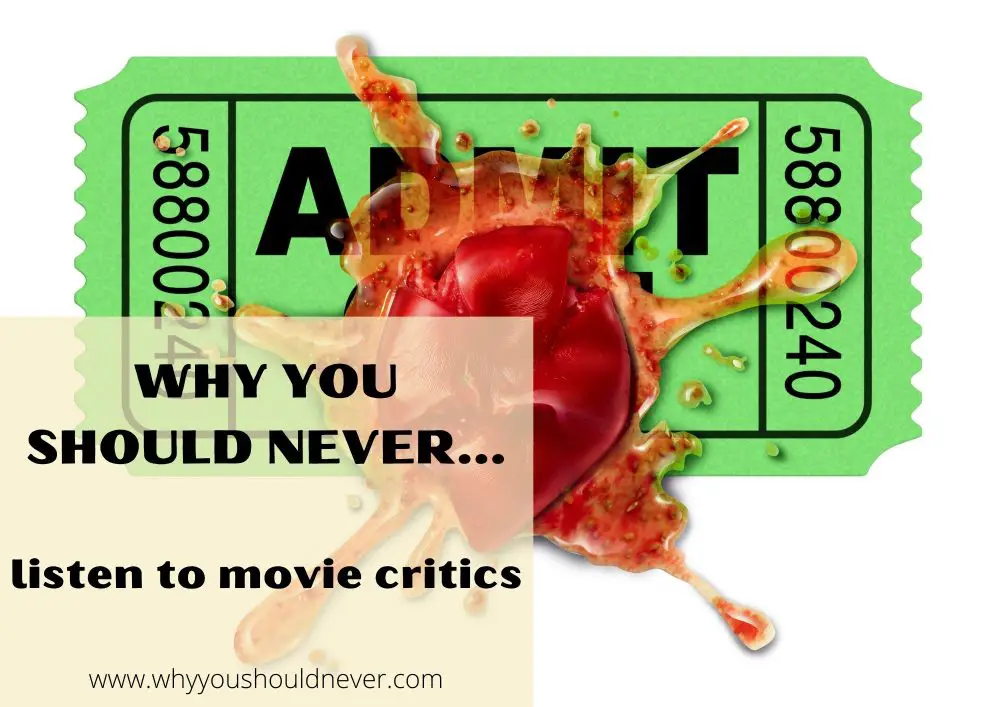![]()
Why You Should Never Listen To Movie Critics
The movie industry is constantly changing. Year after year, new movies are released that challenge the norms of what a “good” film should be.
This has caused many people to turn to critics for guidance on which films they should see and which ones to avoid.
Movie critics have been around for as long as movies themselves. They are an opinionated bunch who can’t resist telling you what they really think about a movie, both the good and the bad.
But should you listen to them? Should you let their opinions sway your decision on whether or not to see a movie?
Absolutely not!
While word of mouth is the most effective marketing strategy there is, the mouth from which the word comes is as important as the word itself.
In this post, we’ll discuss the reasons why you should never listen to movies critics.
Their opinions are subjective
They might call themselves critics, but when all is said and done, they’re just regular people, just like you, and their opinions of movies are always going to be subjective.
People can’t be 100% objective about anything, no matter what they say. And this inability to be objective means that biases, prejudices and past experiences will filter into our opinions, whether we like it or not.
So, that critique you just read about a film that you thought from the description sounded interesting, is heavily laced with a lifetime of the movie critic’s biases, personal likes and dislikes.
These will differ from yours, naturally. What they like you might dislike, and vice versa.
Which means that the movie they’ve insisted is boring could be the greatest thing you’ll ever watch, but if you listen to them, you might never get to see it.
You don’t know their motives
There could be many things underpinning a critic’s review of a movie, and some of these might not be honest. They could have ulterior motives. Some of these motives include:
-
personal like/dislike of people in the movie – the critic may know the star of the movie personally, and this could influence their overall critique of the movie
-
financial incentive – they could have been paid to write a positive or negative critique in order to promote or sabotage the movie
-
competition – they might be working on a similar project themselves, and thus are trying to “take out” the competition
Professional movie critics often have connections to the Hollywood bigwigs, so there are plenty of opportunities for corruption.
Their review might not focus on the things that matter to you
Movie critics tend to focus on things that the normal person, i.e. you, wouldn’t notice or care about.
For example, they might talk about things like the cinematography or music score not hitting the mark, but for the average person, these aren’t things that would influence your enjoyment of the film – at least not completely.
You could be more concerned about the acting or plot than if the movie looks and sounds beautiful. These things are secondary to most people looking for entertainment.
They might not like the genre in general
Movie critics often critique movies in genres they don’t usually like or watch, which goes back to the subjective nature of their jobs.
They’re basically coming into the movie highly prejudicial, and the movie has to work overtime to even stand a chance of getting a good review from them.
Critics often look for critical things to say, just because
It’s in the job title. At some point a critic will mention something critical, even if they thought the movie was great.
It will usually be something small and trivial that they’ve picked out from the movie, but they’ll focus on that just to have something negative to say. This is their way of trying to appear more balanced.
These are usually things that wouldn’t spoil a viewer’s enjoyment of the movie, but they could still act as deterrents to people watching the movie.
Conclusion
Critiques are certainly important when trying to decide what to watch, but these critiques should come from people you know and trust, not someone who does this stuff for a living.
